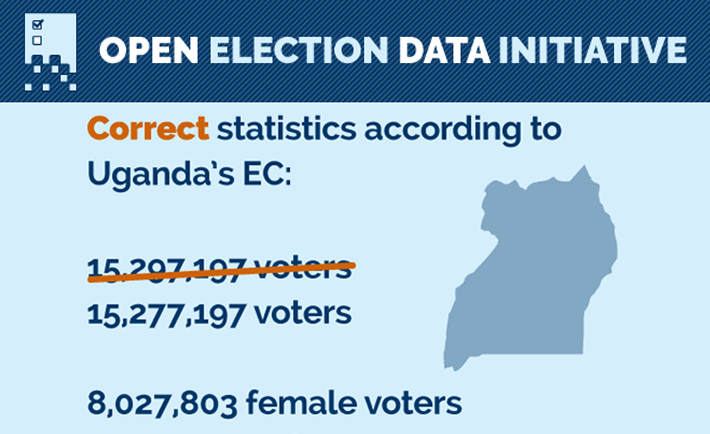We here at the Open Election Data Initiative noticed yesterday that the Election Commission of Uganda made voter registration information available for free at a granular level. Naturally, we were excited to see those two open data principles at work. The Election Commission published a file with the number of registered voters for each polling station along with the number of females and males registered at each station. The problem: they posted it as a dreaded PDF file, which is not an analyzable format.
Two enterprising citizens in Uganda, Evelyn Namara and Javie Ssozi, took the PDF file and did the hard work of converting the information to analyzable format. Next, they added up the numbers for the female and male voters and discovered the totals did not match the totals given in the Election Commission’s original file. When they added up all the figures for female and male voters, they got 15,277,197, which was 20,000 voters less than what the Election Commission listed as the total number of registered voters in Uganda.
Granular, Analyzable and Timely data for the win!
Various theories emerged to explain the 20,000 ‘ghost’ voters. Some argued that the 20,000 were distributed throughout all the polling stations (one voter here, three voters there) and that the field for female/male might be just be missing for those voters. Others alleged that the 20,000 were made up to be used in some nefarious way.
Thankfully, the Election Commission noted the concerns and promptly responded. Today, the Commission apologized for the error and explained that the previously listed 15,297,197 total was outdated. The list of voters has since been cleaned and 15,277,197 (the figure Evelyn and Javie posted) was the correct and up-to-date total. The Election Commission then posted a corrected polling station list (unfortunately still in a ‘locked’ PDF format, but at least it is still granular and timely).
This series of events provides a nice example of how concerned citizens can use open election data to help identify mistakes. And when the Election Commission responds in a timely and transparent way, they work together to increase confidence in that part of the election process. Ugandans go to the polls next Thursday, February 18. Here’s hoping they make the election results data freely available and publish them in a timely, granular, and analyzable format.

